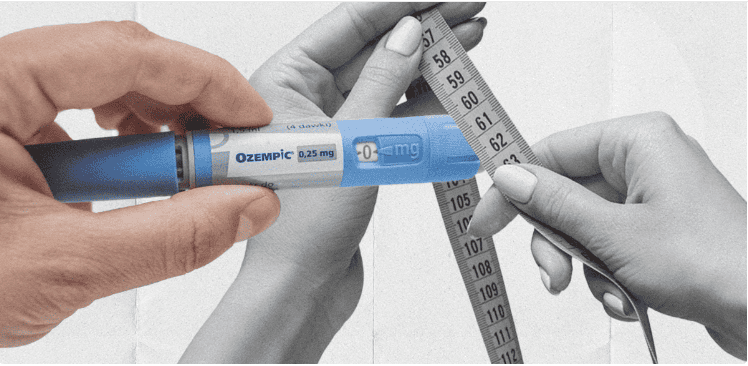By Leanna Coy, FNP-BC
KEY TAKEAWAYS:
- Glucagon-like peptide-1 (GLP-1) medications like semaglutide (Ozempic, Wegovy) and tirzepatide (Mounjaro, Zepbound) remain popular, but expensive options for weight loss.
- In 2022, drug shortages led to compounding pharmacies being able to sell their own versions of these popular drugs. However, the compounded versions were never intended as a long-term replacement.
- When the drug shortages ended, the Food and Drug Administration (FDA) ended approval of the replacement compounded versions of the drugs, except in cases of medical need.
- Compounded versions are still available as companies phase them out. Some companies will also continue offering compounded versions with alternative dosing and tweaks to the formula.
Glucagon-like peptide-1 (GLP-1) medications remain popular for weight loss. This popularity is despite their expense, which runs about $1300 at retail pharmacies, like Fred Meyer and Safeway. For the last several years, consumers had the option of using a compounded version of these drugs due to shortages of the medications. The Food and Drug Administration ended approval for compounding pharmacies to continue making their own version of these drugs as of March 19, 2025. Many consumers are left wondering what to do next. Fortunately, there are options.
What are GLP-1s?
Originally created to treat type 2 diabetes, GLP-1 medications have become popular for weight loss. They work by lowering the sugar (glucose) in the blood and reducing appetite by slowing down peristalsis, the movement of food through the digestive system.
Liraglutide was the first GLP-1 medication approved by the FDA for weight loss in 2014. However, the two drugs most often talked about for weight loss are semaglutide, which is known as Ozempic when used for diabetes and as Wegovy when used for weight loss. The names are different, but the medication is the same. The other drug is tirzepatide, known as Mounjaro when used for diabetes and Zepbound when used for weight loss.
These medications all require prescriptions. Semaglutide and tirzepatide are both taken as once-weekly injections. Semaglutide also comes in pill form. Patients typically start on a low dose and are gradually tapered up to help reduce side effects. Common side effects include constipation, nausea, and acid reflux. Studies show patients lose an average of 5-20% of their body weight over about 1.5 years.
Compounded GLP-1s
In 2022, there were shortages of both drugs due to increased popularity and decreased manufacturing during the pandemic. To fill this gap, the FDA began allowing compounding pharmacies to create their own versions of the popular GLP-1 medications.
Compounded drugs are not new. Pharmacies specializing in compounding traditionally create versions of medications with changes to dosing, form of the medication (e.g., liquid instead of pill), or by removing potential allergens, such as dyes. These versions are frequently used for patients who cannot tolerate a standard medication due to allergies, problems swallowing, or needing a non-standard dose. Some of these pharmacies are large, manufacturing facilities.
The compounded medications did not go through clinical trials and are not FDA-approved. This means the agency does not assess the medication for safety, effectiveness, or quality.
The compounded versions typically cost much less than the retail price of a name brand. With the average monthly costs running $130-$500, depending on the pharmacy, the compounded versions put the medications in reach for many more consumers.
The current state of compounded GLP-1s
In October 2024, the FDA announced an end to the shortage of tirzepatide. They announced the end of the semaglutide shortage in February 2025. The following month, the FDA pulled approval for the ongoing use of compounded versions of these drugs, leaving many users wondering about what to do next.
As companies and consumers look for workarounds to this change, compounded versions of the medications are still available. Some companies are working through their compounded supply as the FDA gave them a grace period. Other companies plan to continue supplying compounded versions that skirt the FDA limits by:
- Providing alternative formulations that do not directly copy the name-brand versions. These versions often contain additives, such as vitamin B12.
- Prescribers continuing to writing prescriptions for custom dosing.
- Offering alternative method for taking the medication in the form of sublingual drops. With this method, drops of the medication go under the user’s tongue. There is limited research backing the safety or efficacy of this method.
Novo Nordisk and Eli Lilly, the companies that manufacture Wegovy and Zepbound, paid attention to the popularity of the compounded drugs. Both drug manufacturers now offer direct-to-consumer versions of these medications at deep discounts. The primary difference is the that user must draw up the doses from a vial instead of using pre-filled syringes. Direct-to-consumer options can help users transition from the compounded versions to the name brands. However, at $349-$499, this option remains unaffordable for many patients whose insurance does not cover weight loss medications.
Obesity is an epidemic in the United States. Obesity negatively impacts a person’s overall health and well-being. The GLP-1 medications are life-changing for many who struggle with this issue, and they will likely remain popular for some time due to their proven ability to help with weight loss. But until there is better insurance coverage for treating obesity with these medications, they will remain out of reach for many. If you are dealing with a weight issue, check with your insurance company regarding coverage and talk with your doctor about your options.
How to save on FDA-approved GLP-1 medications
- Manufacturer copay cards for Ozempic and Wegovy: Novo Nordisk is offering a discount card for those with commercial insurance. This can cut the cost to as little as $0 a month for Wegovy or $25 for Ozempic. The offer does not extend to those with government insurance, such as Medicare.
- Manufacturer copay cards for Mounjaro and Zepbound: Through their Lilly Direct program, Eli Lilly has a discount card for those with commercial insurance. This can decrease the cost to as little as $25 per month for Zepbound. This offer does not extend to those with government insurance, such as Medicare.
- Direct to consumer pricing: For those uninsured or paying out of pocket, both drug manufacturers offer direct-to-consumer options. Wegovy is $499 for a 1-month supply with their discount card. Zepbound is $349 a month for the 2.5 mg (lowest) dosing and $499 a month for the higher doses.


